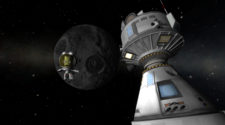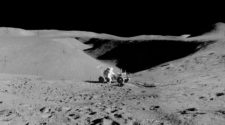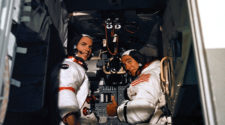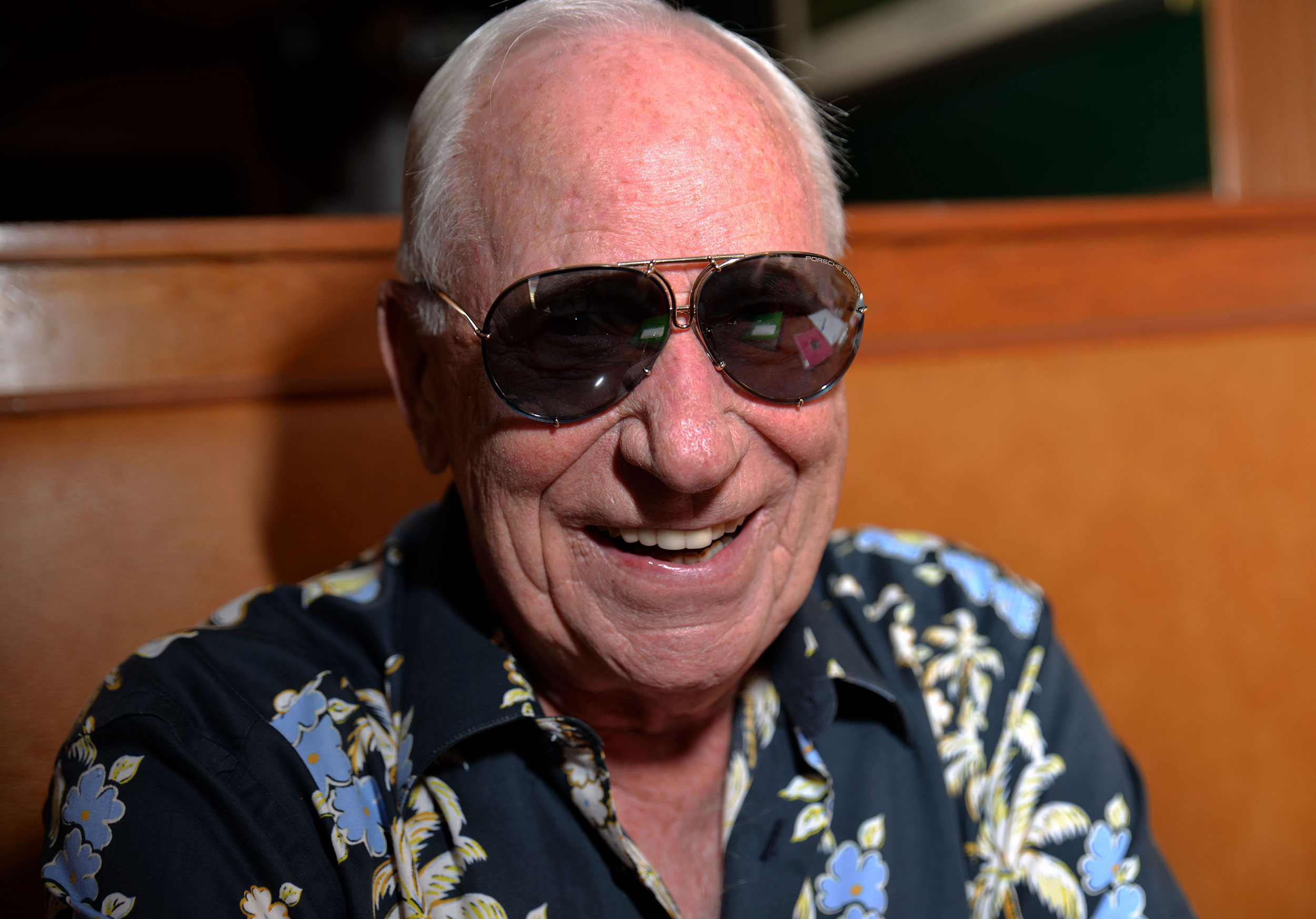
“Do you know what they did down on the Moon? What those guys’ primary job was?
They picked up rocks and dirt. Now, myself, in lunar orbit...”
— Al Worden, Apollo 15 CMP
USAF Colonel Alfred Worden served as Command Module Pilot for Apollo 15 – the fourth manned lunar landing mission. He also holds the record for the furthest deep-space Extravehicular Activity (EVA) (more commonly known as a spacewalk) any astronaut has ever done. He spent 38 minutes working in the vacuum of space, getting a perfect view of both his home planet and the Moon at the same time. Worden has spent, in total, 295 hours and 11 minutes in space. On top of his many accomplishments, he has authored three books: “Hello Earth! Greetings from Endeavour”, “I Want to Know About a Flight to the Moon”, and his autobiography, “Falling to Earth”.
I, along with our photographer, Julian Leek, planned to meet with Worden for brunch on a Sunday afternoon for this interview. I arrived a little early on that day and when I walked into the restaurant, there was a framed photo of the view of Earth from the moon on the wall, signed by him. The host sat me at “his table” and let me know it was the one he likes the most. I had barely set my stuff down when I saw him walk in. Everyone working in the restaurant seemed to know him – I could tell that he was a regular. He greeted the staff with a huge smile and knew most of their names. When the waitress came to take our order, Worden suggested his usual choice. We had a delicious meal consisting of steak tidbits with eggs Benedict and great conversation before we got down to business.
When Worden tells a story, he makes you feel like you experienced it with him. He is genuine and what struck me about him was how open he was in giving his opinion on anything and everything I asked about. No question was too personal, nothing was off limits – he had a lot to say and was wildly fun with his answers. His opinions about his crewmates and people in his life were given in a lighthearted manner, and though he was very serious about his political, scientific and professional questions, he rarely told an entire story without inserting some clever, witty joke. By the end of the interview, the muscles in my face hurt from laughing so much and so hard.
I thought he would reveal a lot of poetic epiphanies he had as he traveled to the Moon and back, however, I realized that, ultimately, he was a man serving his country who simply did the job he was sent to do. I came out of this interview with an entirely new understanding of what being an astronaut is all about. Honor.
I present to you, the inner workings of the mind of Colonel Al Worden.
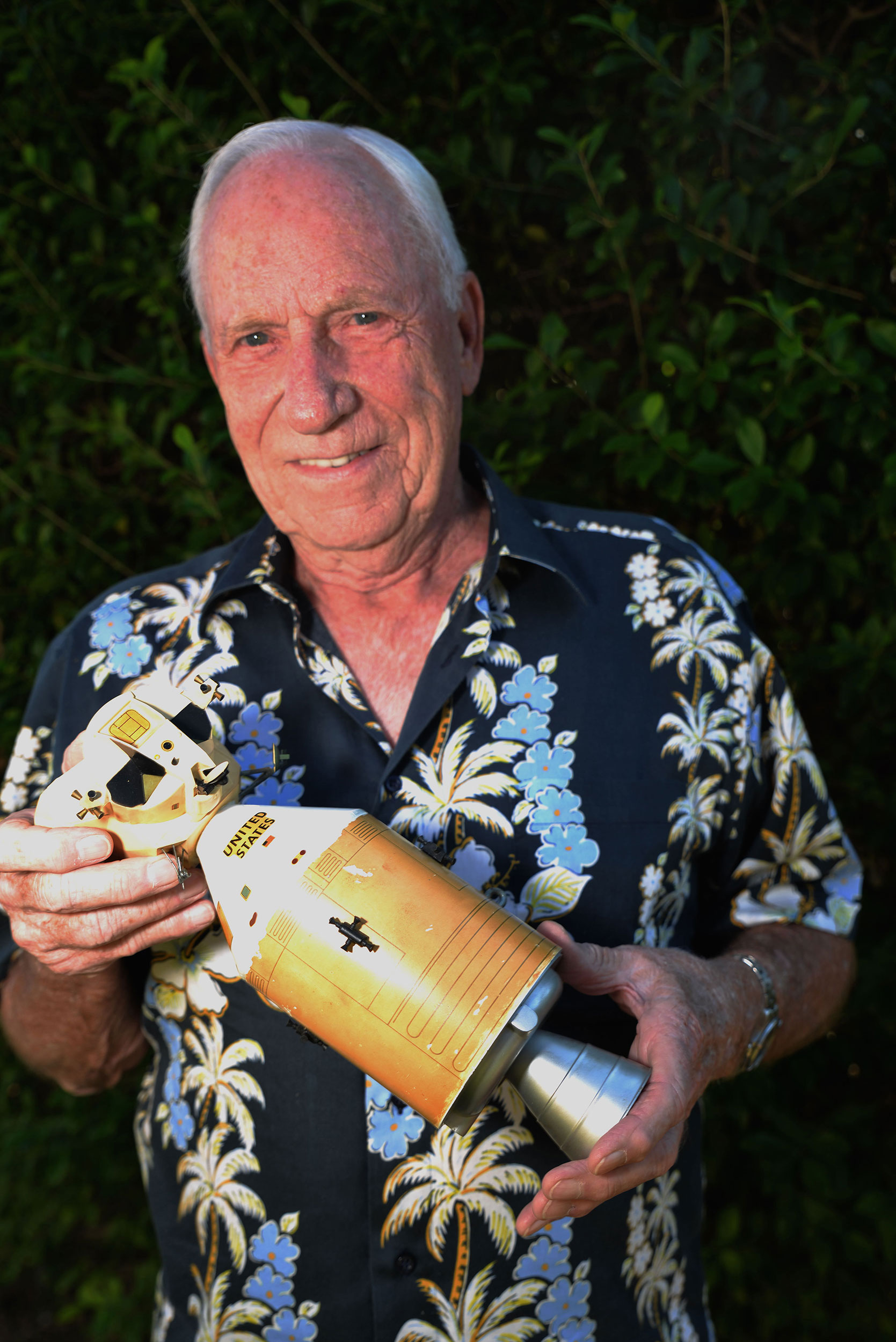
RocketSTEM: Where in your set of life experiences does going to the Moon rank?
Alfred WORDEN: “I can’t give you an honest answer about where the Moon ranks in the high points of my life. What you have to understand is that going to the Moon is learning a skill. Its not a mental activity, as such. I think there are other things more important in my life than going to the Moon. That was certainly the high point in terms of how I lived and what I did and where I was, but I think there are other things that are higher – like writing a book. To me, writing a book – it requires intellectual power to write a book. It requires you to think, so I think writing a book requires more of a person than going to the Moon. So, the Moon was important, I loved it. In terms of what the media thinks about it, yes, it was the high point of my life, but it was not actually the highest point of my life.
“My high point was back in the 80’s running for United States Congress. I thought that was a very important thing to do. I put everything into it and lost, but that is okay. The next is writing books, and I guess the lunar trip was in there somewhere too.”
RS: Did you have any great epiphanies being in space? Is there anything that we cannot understand because we haven’t been in space?
WORDEN: “I don’t think people get Earth. I don’t think people understand what Earth is. I don’t think people understand that the Earth has a finite lifetime, I don’t think people understand that the sun is going to burn out one day and we’re not going to be able to live here anymore. I don’t think people understand that it’s important for us to organize our different societies and our different religions and our different political organizations to live peacefully here on Earth because if we don’t we are going to destroy Earth before the sun is going to burn out. The way things are going right now, I think the Earth’s lifetime is a lot shorter than what we would see if it ran all the way till the sun finally burns up all its energy.
“So…where was I? I got all tangled up in my own rhetoric! (Laughter)”
RS: What is something that only you could know because you went to space, that no one on the planet that hasn’t gone to space could possibly know?
WORDEN: “Just about everything! (Laughter) People do not understand space or anything beyond what they can see, which from where we are right now, is a very short horizon. When you fly in an airplane you see a little horizon. When you fly in space, you see a big horizon. You see the Earth the way it is. I think that we are very uninformed about who we are, how we got here, where we are going and how much lifetime we have here on Earth. But you get a sense of that when you go to space.”
RS: Do you think that we overestimate our importance in the universe?
WORDEN: “Absolutely! We, in general, think that we are the only ones in the universe that are like us. How wrong can you be! People do not have open minds about it. It is inevitable, absolutely inevitable, that there are other people out there that are not only LIKE us, but have a million years advanced on us, and they can come and go as they please. That is what we will be able to do in a million years, so we are behind them. I don’t believe in UFO’s because I’ve never seen one, felt one, or got a piece of metal off of one, a UFO is evidence and until that evidence is solid, I have a problem with that. BUT. If you look at the philosophical side of the equation, and you ask the question, “Do you think there is life out there?”, the answer is absolutely, 100%, YES.”
RS: How did you end up becoming an astronaut?
WORDEN: “I was born in Jackson, Michigan. My parents were just regular people, we had 6 kids in the family, and we lived on a farm. In fact, I ran the farm from the time I was 12. Something interesting- back in those days, if you were a kid living on a farm, you could get a driver’s license when you turned 14. So the day I turned 14, my dad took me down to the driver’s license bureau and I got my driver’s license. I learned to drive on a tractor! I bought my first car at 15. I paid $30 for it and I had a whole succession of cars after that which I rebuilt and repaired.
“One of the things that was important to me was that since I was totally responsible for the farm, the cows, pigs, chickens, grow the corn, cutting the hay, until I was 18, when I went off to college I decided to put that behind me and that I was never going back to it. There was no way I was going to live the rest of my life on a farm. That kind of got me started down the path that led to NASA.
“When I graduated from West Point in 1955, I elected to go in the Air Force – flying was a very exciting thing – even though I had no experience at all. When I went into flight training, I found that I had kind of a knack for it. When I graduated from pilot training, I went into Air Defense Command. When I was in that squadron in Washington, I got involved with the maintenance in the hangar and eventually took it over for the squadron commander. Air Defense Command wanted me to come up and walk around to all the squadrons in the country and teach them how to do that (maintenance in the hangar), too. I decided that if I’m going to do staff work like that, my best bet was to try to get back to college. If I was going to sit at a desk, I was going to do it for something that was good for me.
“So I got orders to go back to the University of Michigan. I spent two and half years there getting three master’s degrees, and when I graduated from there, I applied for and got selected for test pilot school. I went to England to Empire Test Pilot School and graduated from there in 1964. The U.S. Test Pilot School was visiting just before I graduated, and they told me they needed me back at Edward’s Air Force Base, so they got my orders changed to go there.
“I had been at Edward’s for a year when I saw that NASA had a request for applicants.
“At that point, I had all the squares filled. I had everything they needed, which was a little bit unusual back in those days. So I applied and got into the program. You had to have a certain amount of flying, you had to be academically qualified, you had to have very, very good efficiency reports leading up to that point. You had to be under 6’ tall, under 35 years of age, pass a physical, all those things – and I could do all of them.
“I was lucky and got in, but I did not start out thinking that I wanted to be an astronaut. That was never in my mind. I just wanted to be the best pilot I could be. I tell kids all over the world when I talk to them, you pick whatever it is you want to do, but be the best there is at it when you do pick that, and you will find that at the end of the road, doors will open for you that you never even thought of.
“So, that’s what happened to me.”
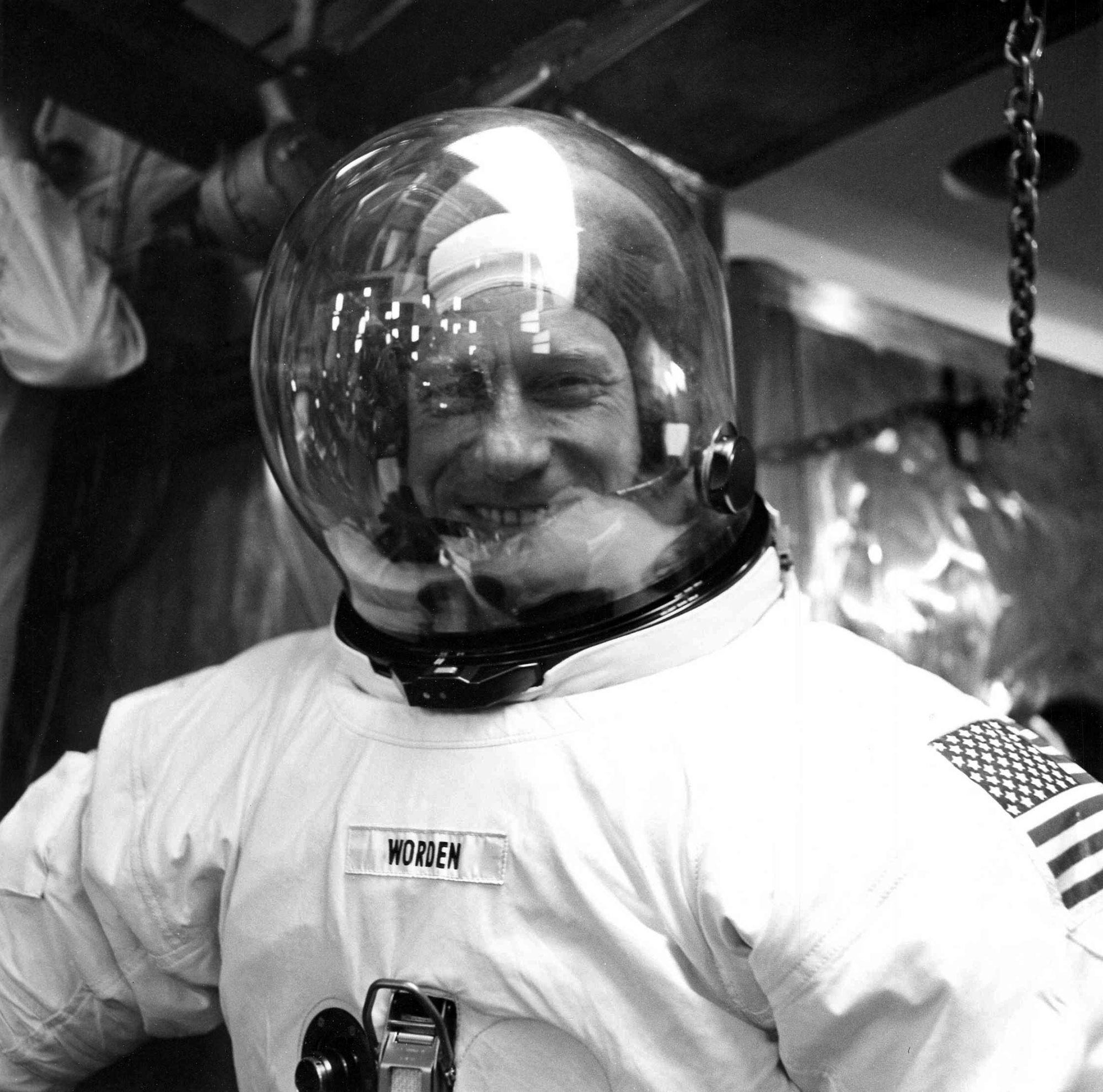
RS: Speaking from your experience, what skill set would be most beneficial to a student today to get them ready for the astronaut corps?
WORDEN: “I don’t think there is any one thing that a student has to focus on. I think whatever they do, it has to be in the sciences, in the STEM courses somewhere. But, I think that when they are in those courses, that have got to be outstanding. That’s the key to it. They have got to put everything they have into it, and be at the top of their class and be the best there ever was. They also need to be in good physical shape.
“But, I would not tell any student that the astronaut program should be their end goal. Whatever specialty they are in, they have to be the best they can at that and it might happen that NASA needs that specialty at some point. I think it’s a tragic mistake for them to go into it thinking they are going to study to be an astronaut, because if they don’t make it, then they are going to be disappointed. I think they have to be the best they can at whatever they are. You cannot organize your entire life to have one outcome, it just doesn’t work that way.”
RS: What kind of research and missions would you like to see happen in the future?
WORDEN: “I think we need to keep going outward. I don’t care whether we go to an asteroid, I don’t care whether we go to Mars. I think going to the Moon is probably a losing proposition at this point – we’ll let the Chinese do that – they’re going to do it. I think what we have to do is develop propulsion systems that get us way out there, not just in the solar system, but somewhere else. I absolutely believe we will develop the means of going faster than the speed of light. It might take us a thousand years, but you know, we had the same problem with the speed of sound and we proved that was nothing. We are going to develop machines and propulsion systems that are going to get us out there. I think propulsion is the secret to everything. And when we get a propulsion system that will get us where we need to go without expending a lot of resources, then we can truly begin to explore our neighbors outside the solar system. That’s where we’re going to find, probably, people like us.”
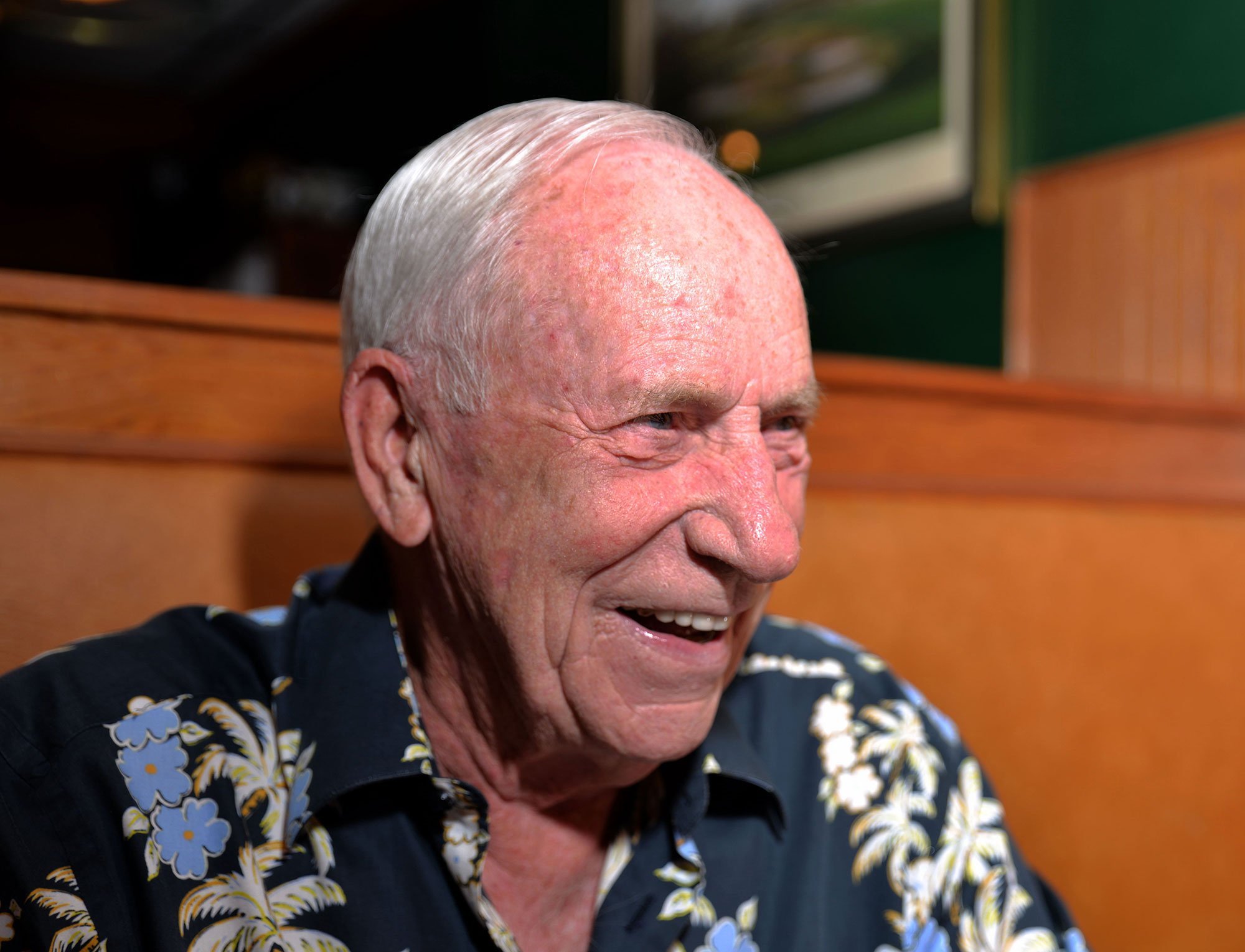
RS: What legacy do you want people today and future generations to acknowledge?
WORDEN: “Legacy? If I had a ‘theme song’ that would make people understand what I would request, it would be ‘independence’. Independent thought, independent work. Do not rely on somebody else, particularly the government, to do anything for you. This is a nation of independent people, this nation was born by people getting away from something and doing their own thing once they got here. We have lost that today. We need people who are independent in their thinking and their research, that are going to barge forward and do what’s right to get this country out ahead. So I guess my thing would be independence and thriving.”
RS: In the future do you think space will be accessible to the average person the way flying is now?
WORDEN: “No, not for a long time. Many of the similarities with aviation are out there. There was a time when going somewhere on an airplane for an average person wasn’t going to happen. And there was some thinking that you would never fly from one city to another. Today, the only issue is, “Does the airline fly on time or not?”. Space could get that way some day, but I’m just not sure that the cost and risk is going to be the same. The shuttle was supposed to be routine, but it wasn’t, every flight was kind of different. We lost more shuttles than we lost Apollos. It was a very dangerous machine, it was not safe. We are now finding that SpaceshipTwo is not a safe spaceship. Even when it starts flying passengers, they’re only going to go straight up and straight down. To me, that’s not space. They can pay their $200,000 dollars and say they’ve been to space, but that’s just a very, very momentary thing. That whole flight’s only going to take 15 minutes. The difference between going straight up and down compared to going into orbit is about five times the speed. You have to go five times faster to go into orbit, and the only way to go to “space” is to at least go into orbit. So, in my opinion, SpaceshipTwo and all these others flying people up and down, aren’t going into space. You’d have to be someone who can pay $20 million dollars to go, then you’d be going to space.”
RS: What direction do you hope NASA will head towards in terms of human spaceflight?
WORDEN: “Well, I think it’s time for NASA to get off its butt! I think it’s time for someone at NASA to have the courage, and the perseverance to make sure that we step out. It may not happen for a few years, but we are going to get there sooner or later, it’s just that pressure to win. Going to Mars is important because it is going to force us to develop propulsion systems and life support systems that will manage a year and a half flight. The moon’s only two weeks, you can do almost anything, it’s easy to get to the moon. In fact, going to the moon is easier than going into Earth’s orbit if you really want to know! It is a straight line flight! Going into Earth orbit, you’re going around and around and around. I think the next step is Mars, then we’ll probably be looking at some moon of Jupiter – Io or Europa – and each of these is an incremental step outward. Eventually we will develop the propulsion capability that will take us beyond that. You know the ancient Chinese proverb, ‘A trip of a thousand miles starts with one step’? We’ve made the one step. Now we need to make the second one.”
RS: Do you think there is life on Europa?
WORDEN: “I have no idea, and I don’t really care. Who cares if there is life in the solar system? We are not going to find the kind of life in the solar system that we’re looking for anyway. I don’t care what it is, it could be biological life, plants growing there, but no, we have to go a lot further out to really find something that’s compatible with the way we are.”
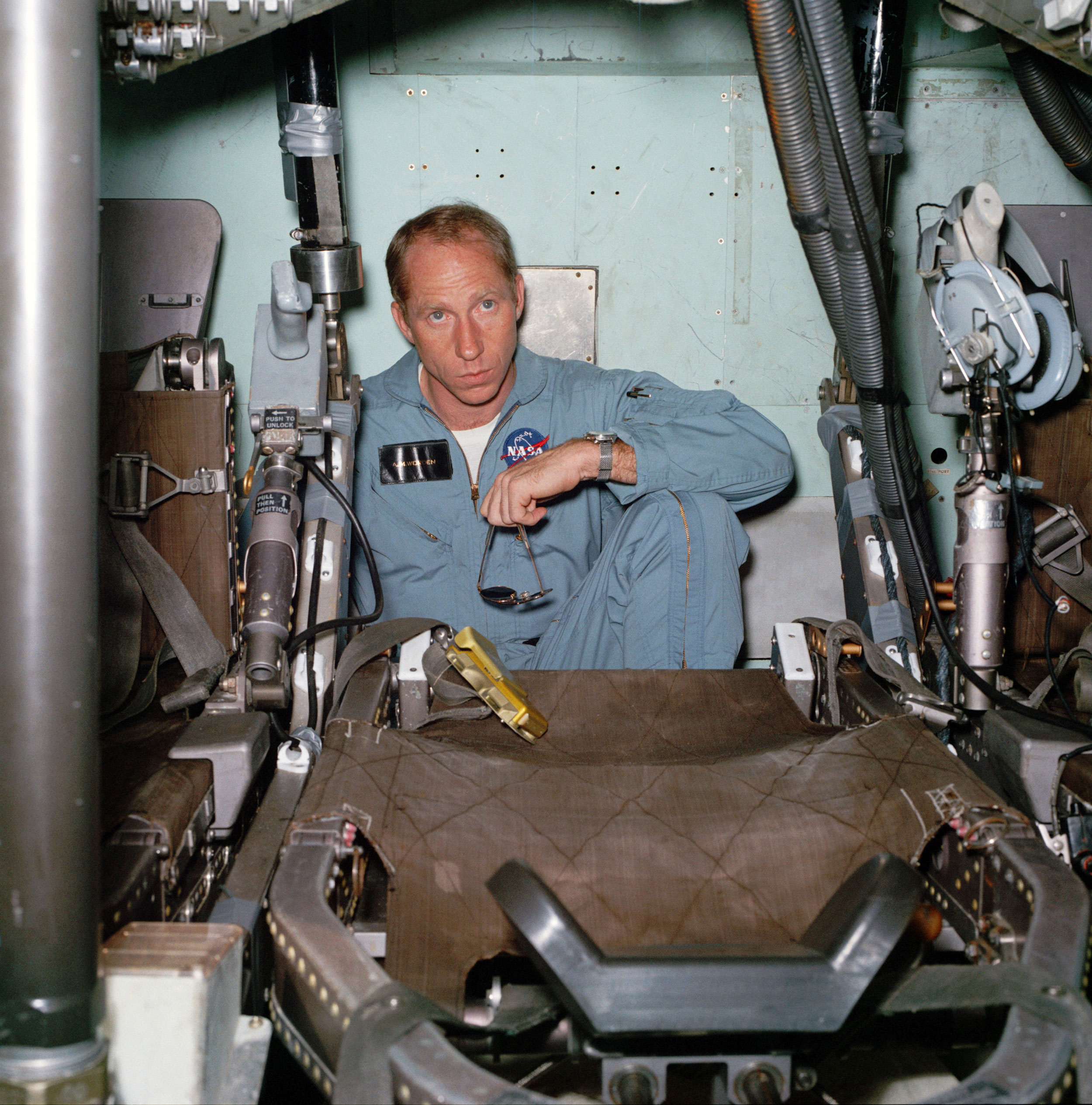
RS: If you had an opportunity to fly into space again, what crew, mission and vehicle would you prefer?
WORDEN: “I would want a different spacecraft, I would love to go to Mars. It’s a year and half trip. I would take guys like Paul Weitz and Jim Irwin (if he was still alive). I’d pick a crew like that – all of us old guys. I think the Mars trip is the trip for old guys. We have better far vision, but most importantly, we can sit still for days at a time! We’ve got patience. If they provided me with a television set I’d just sit there and watch it! I don’t get the heebie-jeebies to move around and do things like a young guy would. So, we’d be much more adaptable for going to Mars than a young guy!”
RS: What if it was a one way trip?
WORDEN: “Who cares! I’m 82 years old! Who cares! I’m going to go sometime anyway. Might as well go doing something useful!”
RS: What is your favorite … word?
WORDEN: “Honor.”
RS: Color?
WORDEN: “Blue.”
RS: Book?
WORDEN: “My own.”
RS: Movie?
WORDEN: “2001: A Space Odyssey. It really sparked my curiosity. It really makes you think about what we are and it was very inspirational to me – a real eye opener. They had a lot of things right!”
RS: Animal?
WORDEN: “Dog.”
RS: Song?
WORDEN: “Anything that The Beatles wrote. I was there in ‘64 when they were just hitting it big!”
RS: What did you think of the movie Gravity?
WORDEN: “I thought it was crappy. The special effects were amazing but the technical side of the movie was absolutely horrible. They got NOTHING right! You do not maneuver around in orbit from one space station to another using a fire extinguisher! That just cannot happen! And the meteor shower – those clip the edge of the atmosphere and keep going, they do not enter Earth orbit! They had everything wrong! And I did not like the role Sandra Bullock played! All she did was cry and scream the whole damned movie. The special effects were just fabulous, though!”
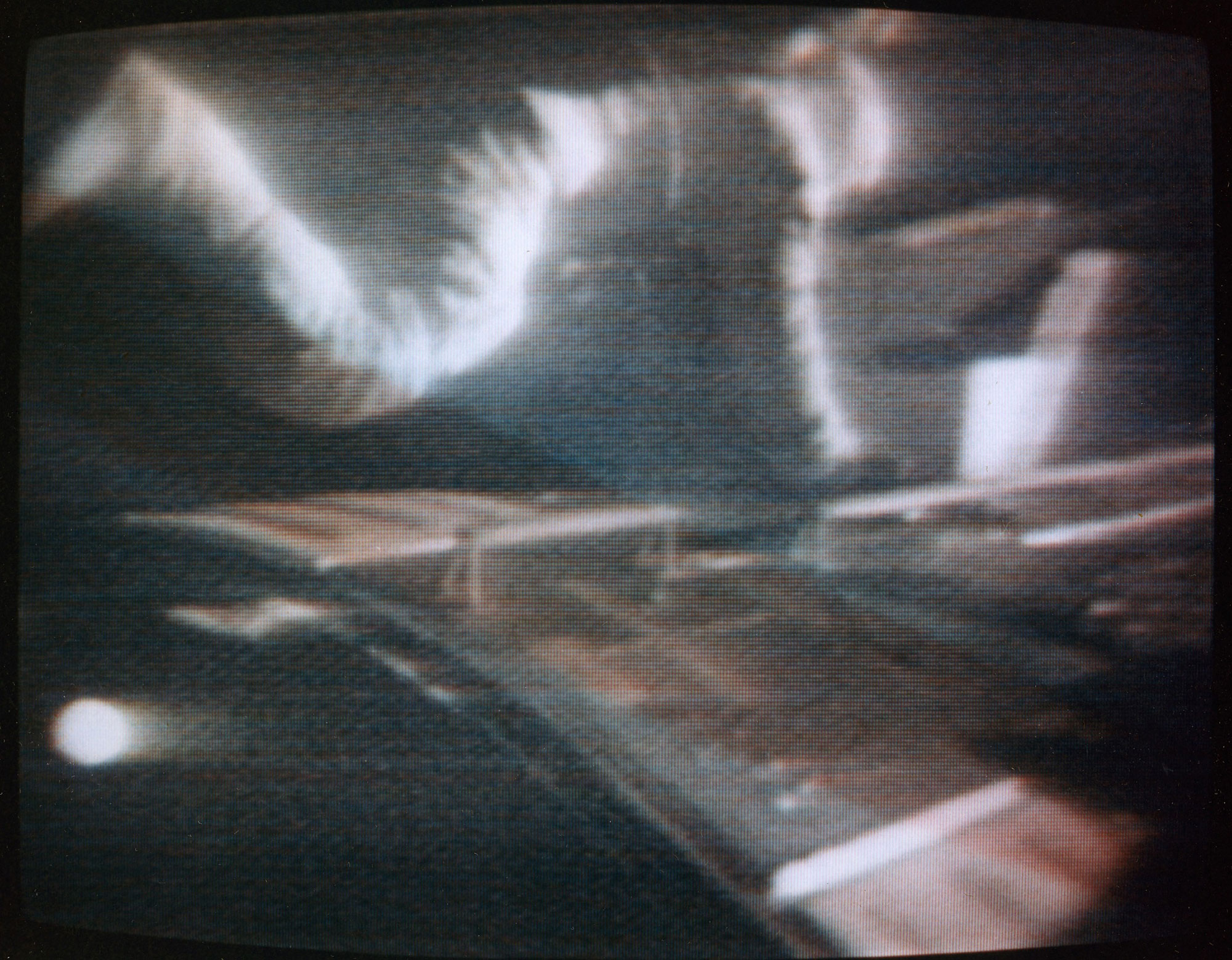
RS: What was your spacewalk like?
WORDEN: “I was 50,000 miles this side of the Moon and 200,000 miles from Earth. We went to the moon, stayed in orbit, came back and did it on the way. The cool thing about it was, I could see both Earth and the Moon at the same time.”
RS: You orbited the Moon by yourself – what were you thinking about while you were alone in the spacecraft?
WORDEN: “Orbiting the Moon by myself was absolutely the best time of the flight. I got rid of two guys after being with them for about three and a half days; they were getting on my nerves (laughter). I was trained to fly an airplane by myself and I’ve always been a loner in an airplane. So, I was very happy being by myself. I got to the back side of the Moon, away from Earth, I didn’t have to talk to Houston, I was in my glory! “
RS: So, did you draw the short straw or the long straw when it came to staying in the module or going down to the Moon’s surface?
WORDEN: “Oh, I definitely got the long straw!
“What people remember as important is all due to the media. They have romanticized the guys that walked on the Moon. Do you know what they did down on the Moon? What those guys’ primary job was? They picked up rocks and dirt. Now myself, in lunar orbit, I did probably a thousand times more science than they did, because I had all these remote sensors and big cameras and all kinds of things I was running the whole six days I was there. Dave and Jim picked up 170 pounds of rocks, huh? Big deal! (laughter)
“But I have to tell you that people focused on lunar walkers as some mystical thing. Jim Irwin even tried to put together an organization likening it to the last supper, where there were twelve astronauts that walked on the Moon. And he didn’t include the Command Module Pilots. But what’s curious about that is, 12 guys walked on the Moon, but only six guys went around it. The media made it such a big thing to have walked on the Moon. And it was a big thing, I don’t want to take that away from them.
“As Command Module Pilot, I had thousands of things to do. Taking pictures, doing visual observations, photographing the surface of the Moon, I had a mapping camera that I used to map about a quarter of the Moon. There were lots and lots of thing to do while in lunar orbit. But the media made it so much more important to have walked on the Moon. I don’t mind it. I am very happy about where I was, because when I flew, it put me in line to be a commander. That is the big difference.
“Also, those guys had all kinds of cameras down on the surface, and they took 7000 pictures of each other. I didn’t take ANY pictures of myself.”
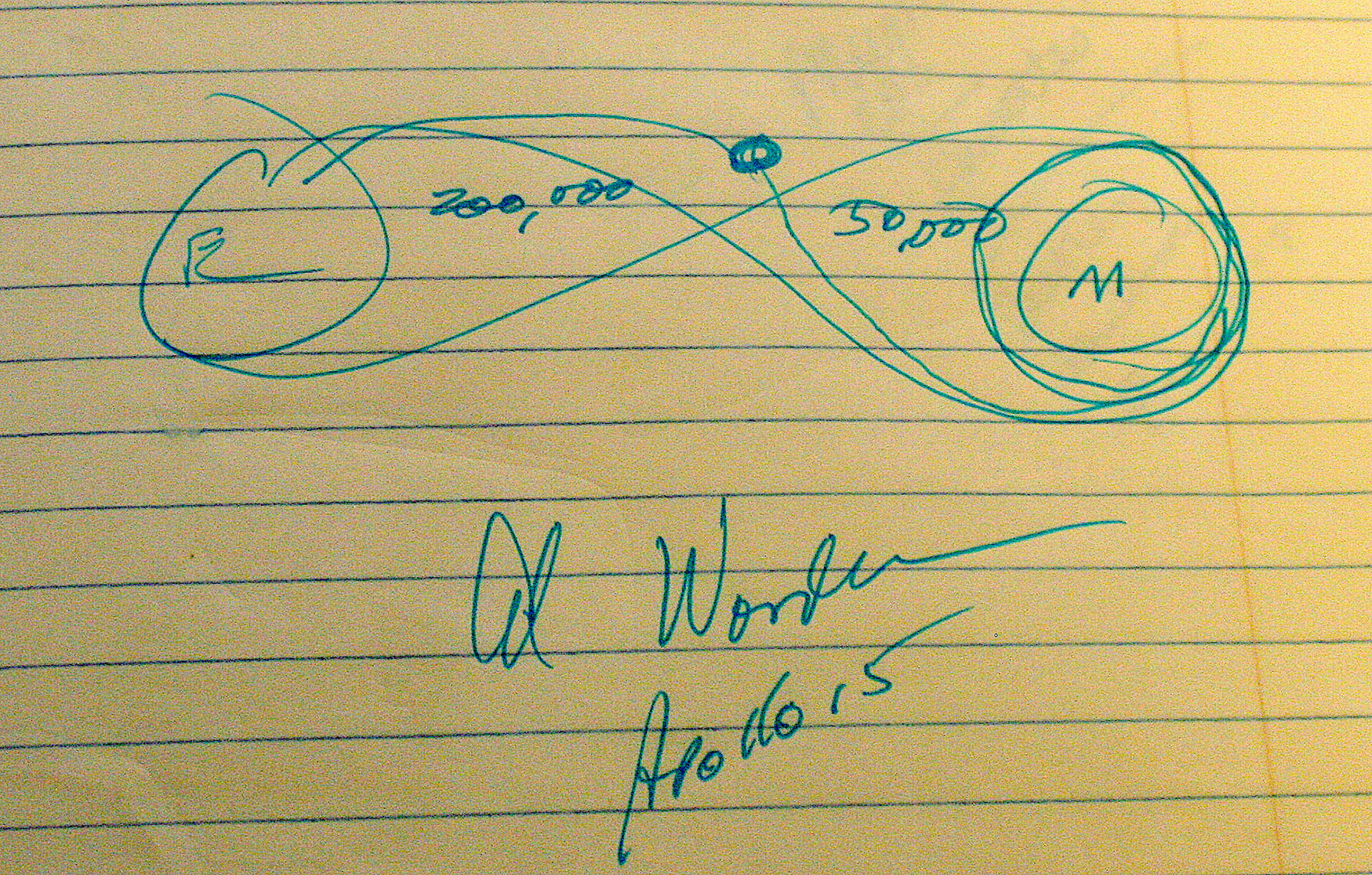
Credit: Sherry Valare
RS: You didn’t get a Moon selfie?
WORDEN: “I didn’t take any selfies, no. When I trained for the flight and was on the flight, all I thought about was taking pictures, but of OTHER things.”
RS: How did you come to terms with the possibility of not coming back?
WORDEN: “We had what I would consider to be a far Eastern thought process on that. There are some things more important in life, than your individual life – one of them is your honor. We were representing the greatest country in the world, and if we didn’t come back, so be it. We were doing our thing. On the flip side of that, you do know that if you die in space, you’re going to be known forever. Does that do me any good? No. But it’s something to think about! And there were no suicide pills, again, that’s from the media coverage.”
RS: How did your family feel about you going to space and the Moon?
WORDEN: “The people in my family were basically pioneers. My mother grew up in a log cabin in northern Michigan. She was very stoic about things. My dad was a little more emotional. I think the only really emotional time they had was during launch because that thing was so noisy that if you’re not a little emotional about it, there’s something wrong with you. But once the thing was gone and I was in flight, they sat at my apartment the whole time I was gone, watched the TV, got updates, and I think they were fine with all of that. I think that as long as everything on a flight goes well, and all your updates are good, they’re doing a lot of partying. I think they did a lot of that.”
RS: What was the first thing you did when you got back on Earth?
WORDEN: “First thing was a physical, then we had lunch with the Captain on the USS Okinawa, then I went back to Houston, got home, and there was a party going on. THAT’s when I had a vodka! Then another! Spent half the night partying, woke up the next morning, went back to the center and started debriefing. Debrief twelve hours a day, go home, party, debrief twelve hours a day, go home and party. By the end of that two weeks I was in much worse shape than I was when I was on the flight!! THAT almost killed me! Tough times! (Laughter)”
RS: What is on your bucket list?
WORDEN: “I have to tell you, I have too many things on my bucket list. A trip to South Africa, to China, building my own airplane, would all be on my bucket list.”
RS: What was the most spectacular moment for you in space?
WORDEN: “Seeing the Moon up close for the first time. Getting into lunar orbit.”
RS: And last, but not least, what did you think when you first saw the Moon?
WORDEN: “Pretty awesome!”

